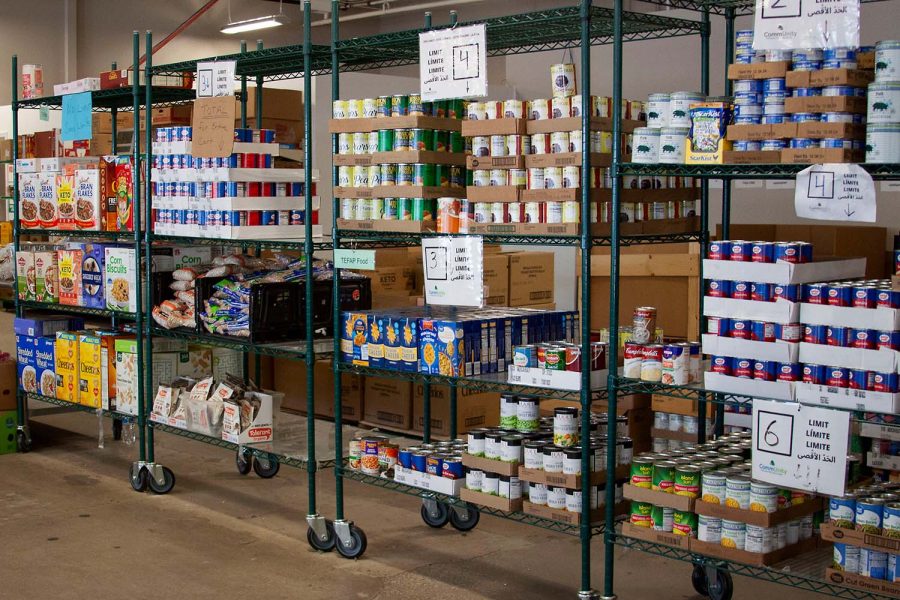Opinion | You can help Iowans in food deserts
Food deserts are all too common in Iowa, but simple actions can help support people experiencing food insecurity.
Food donations are seen inside of the CommUnity Crisis Services and Food Bank in Iowa City on Feb. 14, 2022. The center is a volunteer-driven organization for grocery assistance.
April 3, 2022
You might remember strolling past empty shelves of cream cheese, pet food, and canned goods during the nationwide supply chain shortages in January.
If you thought that was inconvenient, imagine going to your local grocery store where everything was piled high on the top shelf. It could make your weekly shopping trip a stressful endeavor.
This reality is similar to what many Iowans face. Food deserts, or areas where access to healthy foods is limited or non-existent, are all too common in small-town Iowa. Simple actions, like giving food items or supporting local stores, can help people experiencing food insecurity in food deserts.
According to the U.S. Department of Agriculture, food insecurity is defined as “a lack of consistent access to enough food for an active, healthy life.”
With the popularity of corporations like Walmart, Costco, Kroger, and Target, many grocery stores struggle to make ends meet. In the last quarter of the 20th century, half of Iowa’s grocery stores closed.
Sadly, the closure of grocery stores has impacted the accessibility of grocery shopping in small towns across Iowa. Only 63 percent of Iowans live within a 1-mile radius of healthy food retailers, which is nine percent lower than the national average of 54 percent.
Although many are fortunate enough to have reliable transportation to nearby food retailers, people without cars or means of reliable transportation are left with limited options for getting groceries.
Food deserts often lead to food insecurity, as many are left with limited options like fast-food or convenience stores. Researchers have found a high correlation between food insecurity and diabetes as a result. In Chicago, the mortality rate for diabetes is twice as high in food deserts.
On the University of Iowa campus, affordable healthy food options are scarce.
The average cost of groceries per month for a college student in Iowa is $251, according to Education Data Initiative. While stores like Target, Bread Garden, John’s Grocery, and New Pioneer Food Co-op provide access to healthy food options, these stores are outside of many students’ grocery budgets. This can lead many to turn to fast food as an affordable alternative.
Unfortunately, there is no simple solution for grocery deserts in Iowa.
More corporate grocery stores could give some Iowans better access to healthy foods. However, that would further hurt locally-owned grocery stores. In turn, this would continue the cycle of grocery deserts.
On the contrary, more locally-owned grocery stores would give Iowans access to healthy foods. But due to competition and operating costs, small grocery stores are out of budget for many.
While this is no simple path for eliminating food deserts, there are easy actions you can take to help people experiencing food insecurity in grocery deserts.
Local food banks, like CommUnity and the UI Food Pantry, serve low-income individuals in need of food. Donating to your local food bank is essential in keeping this mission going.
Many communities have programs like Meals on Wheels that serve the elderly and people with disabilities who experience food insecurity. Donating and volunteering is another key way you can help those experiencing food insecurity.
If you’re able, shop at small-town grocery stores rather than large corporate-owned stores. While large grocery store chains are often cheaper, supporting grocery stores is essential in keeping them running. Without sufficient business, grocery stores close and the food desert further unravel in many communities.
While the issue of food deserts in Iowa has no simple solution, you can make simple acts to help alleviate the stress and burden people experiencing food insecurity face. Please, do what you can to help bring healthy food options to people in food deserts.
Columns reflect the opinions of the authors and are not necessarily those of the Editorial Board, The Daily Iowan, or other organizations in which the author may be involved.















